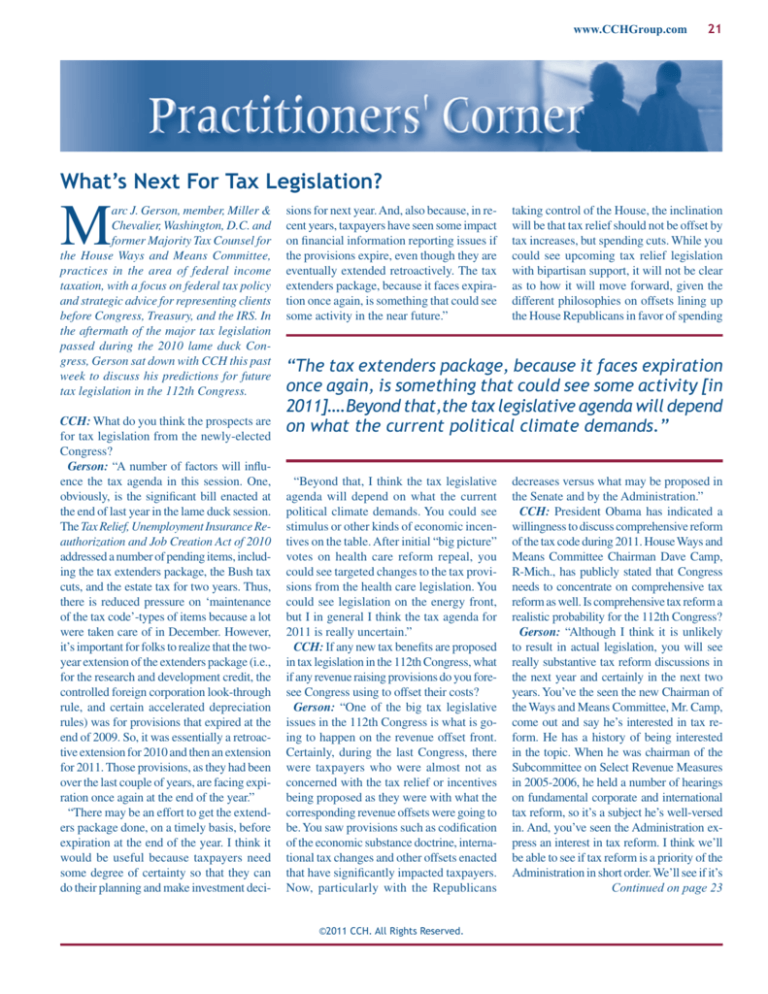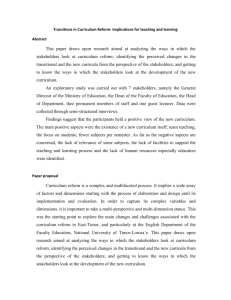
www.CCHGroup.com
21
What’s Next For Tax Legislation?
M
arc J. Gerson, member, Miller &
Chevalier, Washington, D.C. and
former Majority Tax Counsel for
the House Ways and Means Committee,
practices in the area of federal income
taxation, with a focus on federal tax policy
and strategic advice for representing clients
before Congress, Treasury, and the IRS. In
the aftermath of the major tax legislation
passed during the 2010 lame duck Congress, Gerson sat down with CCH this past
week to discuss his predictions for future
tax legislation in the 112th Congress.
CCH: What do you think the prospects are
for tax legislation from the newly-elected
Congress?
Gerson: “A number of factors will influence the tax agenda in this session. One,
obviously, is the significant bill enacted at
the end of last year in the lame duck session.
The Tax Relief, Unemployment Insurance Reauthorization and Job Creation Act of 2010
addressed a number of pending items, including the tax extenders package, the Bush tax
cuts, and the estate tax for two years. Thus,
there is reduced pressure on ‘maintenance
of the tax code’-types of items because a lot
were taken care of in December. However,
it’s important for folks to realize that the twoyear extension of the extenders package (i.e.,
for the research and development credit, the
controlled foreign corporation look-through
rule, and certain accelerated depreciation
rules) was for provisions that expired at the
end of 2009. So, it was essentially a retroactive extension for 2010 and then an extension
for 2011. Those provisions, as they had been
over the last couple of years, are facing expiration once again at the end of the year.”
“There may be an effort to get the extenders package done, on a timely basis, before
expiration at the end of the year. I think it
would be useful because taxpayers need
some degree of certainty so that they can
do their planning and make investment deci-
sions for next year. And, also because, in recent years, taxpayers have seen some impact
on financial information reporting issues if
the provisions expire, even though they are
eventually extended retroactively. The tax
extenders package, because it faces expiration once again, is something that could see
some activity in the near future.”
taking control of the House, the inclination
will be that tax relief should not be offset by
tax increases, but spending cuts. While you
could see upcoming tax relief legislation
with bipartisan support, it will not be clear
as to how it will move forward, given the
different philosophies on offsets lining up
the House Republicans in favor of spending
“The tax extenders package, because it faces expiration
once again, is something that could see some activity [in
2011]….Beyond that,the tax legislative agenda will depend
on what the current political climate demands.”
“Beyond that, I think the tax legislative
agenda will depend on what the current
political climate demands. You could see
stimulus or other kinds of economic incentives on the table. After initial “big picture”
votes on health care reform repeal, you
could see targeted changes to the tax provisions from the health care legislation. You
could see legislation on the energy front,
but I in general I think the tax agenda for
2011 is really uncertain.”
CCH: If any new tax benefits are proposed
in tax legislation in the 112th Congress, what
if any revenue raising provisions do you foresee Congress using to offset their costs?
Gerson: “One of the big tax legislative
issues in the 112th Congress is what is going to happen on the revenue offset front.
Certainly, during the last Congress, there
were taxpayers who were almost not as
concerned with the tax relief or incentives
being proposed as they were with what the
corresponding revenue offsets were going to
be. You saw provisions such as codification
of the economic substance doctrine, international tax changes and other offsets enacted
that have significantly impacted taxpayers.
Now, particularly with the Republicans
©2011 CCH. All Rights Reserved.
decreases versus what may be proposed in
the Senate and by the Administration.”
CCH: President Obama has indicated a
willingness to discuss comprehensive reform
of the tax code during 2011. House Ways and
Means Committee Chairman Dave Camp,
R-Mich., has publicly stated that Congress
needs to concentrate on comprehensive tax
reform as well. Is comprehensive tax reform a
realistic probability for the 112th Congress?
Gerson: “Although I think it is unlikely
to result in actual legislation, you will see
really substantive tax reform discussions in
the next year and certainly in the next two
years. You’ve the seen the new Chairman of
the Ways and Means Committee, Mr. Camp,
come out and say he’s interested in tax reform. He has a history of being interested
in the topic. When he was chairman of the
Subcommittee on Select Revenue Measures
in 2005-2006, he held a number of hearings
on fundamental corporate and international
tax reform, so it’s a subject he’s well-versed
in. And, you’ve seen the Administration express an interest in tax reform. I think we’ll
be able to see if tax reform is a priority of the
Administration in short order. We’ll see if it’s
Continued on page 23
www.CCHGroup.com
Practitioners’ Corner
Continued from page 21
mentioned in the State of the Union Address
or whether it is part of February’s release of
the President’s FY 2012 budget proposals.”
“We are likely to see hearings and discussions on tax reform, a lot of it using the reports
of the President’s Economic Recovery Advisory Board and the National Commission on
Fiscal Responsibility and Reform as spring
boards for Congressional consideration and
discussion. The Senate Finance Committee
began an expectedly large set of hearings
on tax reform late in the last Congress. They
started on “lessons learned” from the 1986
Act. It’s envisioned that they may have around
10 hearings on tax topics. Even though the
politics may not lend itself to a true tax reform
legislative effort, I think you will see a lot of
discussion, perhaps laying the foundation for
a future fundamental reform effort.”
CCH: Can you discuss the anticipated
direction of tax reform discussions in the
112th Congress?
Gerson: “The classic tax reform exercise is
that you broaden the base until you get rid of
specialized deductions and credits. Because
of that, you are able to lower the rate. That’s
an exercise you saw in the reports of the
President’s Economic Recovery Advisory
Board and the National Commission on Fiscal
Responsibility and Reform, to some degree.
The question in that exercise is: What are the
deductions and credits that are viewed as nonessential? Which ones should be eliminated
in order to fund the reduction in the corporate
rate, for example? Obviously, those impact
taxpayers very differently because some
benefit from certain deductions more than
others. In the ideal world, that’s the kind of
exercise one goes through. But, I think that,
from the practical and political perspective,
if you go down that road and people say,
“We certainly need to keep the charitable
contribution deduction We certainly need to
keep the deduction for mortgage interest” and,
you have other people saying, “We certainly
need to keep this deduction,” it’s very hard to
materially change the code to get a significant
reduction in the corporate rate.”
CCH: As you noted, the bill enacted during the lame duck session extended the traditional “extenders” package for two years
through 2011. What do you think the future
holds for the “extenders” package? Is there
a chance it will be extended on a permanent
basis at some point in the future?
Gerson: “With regard to extenders, when
the extenders bill originally passed the House
of Representatives earlier in 2010, there was
a provision at the end of the bill that basically
called for the Joint Committee on Taxation
to do a report or study on the individual
provisions within the extenders package….
It was supposed to evaluate each individual
provision, what it was intended to do, who
it was intended to benefit, and its efficiency.
I think a lot of people believed that if that
provision had been enacted, the JCT report
would have been a mechanism for a full-scale
evaluation of the extenders package on the
merits of the individual provisions. From
that, one could say, ‘This is something that
is working and should be made permanent,’
or ‘These are items that, through inertia, have
been extended every year, but there isn’t as
much support for them.””
“That provision was not included in the final
bill enacted during the lame duck session,
but I think that type of exercise concerning
the individual evaluation of the provisions of
the extenders package is something that will
happen, although perhaps not formalized in
that process. The popular theory is that one
part of tax reform will be to go through such
an exercise with the extenders package. It’s not
helpful to taxpayers, and it’s not helpful to the
Congress, the IRS or to Treasury to constantly
have provisions that are facing expiration.”
CCH: Based upon your experience in
the legislative process, how do you think
the 112th Congress will handle the logjammed, but nevertheless significant, technical corrections to enacted legislation?
Gerson: “The need for technical corrections
is an inevitable result of the legislative process.
They do take a substantial amount of time to
push through the process. Everyone on the
Hill: both sides of the Ways and Means Committee, both sides of the Senate Finance Committee and the Joint Committee on Taxation,
as well as the IRS, and the Treasury Department all have to agree to a technical correction.
Once enacted, they are retroactive.”
“The House had a technical corrections
bill that was introduced in 2009, but there
hasn’t been one that has moved for a significant period of time….Part of the timing
depends upon whether there are individual
technical corrections that are particularly
time-sensitive. There are situations where
there is the ability, absent enactment of an
introduced correction provision, to give
taxpayers their needed comfort level on an
item. Our firm encourages taxpayers who
are interested in technical corrections to talk
to their advisors because there are ways, not
only on the Hill, but also through Treasury
and the IRS, to gain some certainty while
technical corrections are pending.”
CCH’s Tax Briefing: 2010 Year-In-Review Now Available!
The tax law is ever-changing and 2010 was no exception. The year ended with the highly
anticipated extension of the Bush-era tax cuts, an AMT “patch,” and reinstatement of a
modifi ed estate tax. Even without such a dramatic close to the year, 2010 is notable for
numerous tax developments impacting individuals, businesses, exempt organizations, and
taxpayers of all types. Over the last 12 months:
There were more than 20 pieces of legislation enacted that contained tax law changes
There were over 570 changes to the Internal Revenue Code
The IRS issued over 400 regulations, press releases, notices, revenue procedures, and
other forms of guidance
Hundreds of tax disputes were decided by federal courts
And more!
As tax practitioners ring in the new year, start thinking about the coming fi ling season,
and continue planning for their clients, how will they keep on top of all these changes?
CCH provides the most comprehensive, ongoing, practical and timely analysis of the issues that impact tax practitioners and their clients. CCH’s Tax Briefi ng highlighting the
key tax law changes and developments in 2010 is now available at: http://tax.cchgroup.
com/downloads/fi les/pdfs/legislation/tax-yearend.pdf.
©2011 CCH. All Rights Reserved.
23








